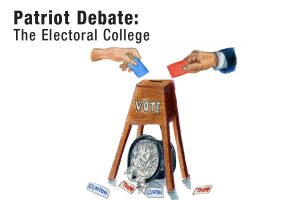Popular vote makes voters’ beliefs truly heard
November 11, 2016
The Electoral College is one that is outdated, unreliable, and in direct conflict with our rights, so why is it still in use? Are the American people not trusted to make the right decision for their country?
When the Electoral College was first instituted in 1804, it served as a way to guarantee that the uneducated and illiterate voters were not the ones making decisions.
This was because more often than not they were incapable of making the right one. However, in today’s society, where the majority of the population is literate and educated, this practice is obsolete and should be eradicated.
Although officials are elected by the public into their positions, there is still a possibility for a member of the College to vote against the general sentiments of the public.
They are just as human as the rest of the population and are just as capable, if not more, of manipulating the system.
Even though the Electoral College can be beneficial in sorting out the votes that do not represent the majority opinion of a district, it poses a threat to the ideals of democracy.
In a political system based entirely on the input of its citizens, an overwhelming abstinence from voting can cripple the political system.
In 2012, 93 million citizens did not vote, according to the Bipartisan Policy Center. According to “American Government: Power and Politics,” the text JC students use in AP U.S. Government, citizens often refrain from voting in the Electoral College system because they feel their voices aren’t being heard.
The popular vote makes everyone’s vote count, regardless of the political ideology of the area they reside in
In the case of the popular vote, constituents’ votes actually make an impact, something that citizens appreciate. The popular vote makes everyone’s vote count, regardless of the political ideology of the area they reside in.
The popular vote tallies every single vote cast for a candidate instead of counting the number of votes of districts who supported a candidate.
When more people are involved in the political process, the president selected represents the will of the people more accurately.
If voters felt that their voice was heard, they might be more willing to vote, something that could positively impact our society.
Overall, if the Electoral College voting process changes into one that is closer to a true democratic process, then Americans’ political beliefs will finally be heard.
Elizabeth Harmison is an In-Focus editor for The Patriot and jcpatriot.com.






